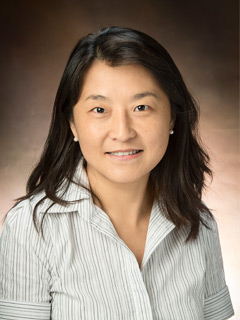HOW CAN WE HELP YOU? Call 1-800-TRY-CHOP
In This Section

Dr. Tong investigates cytokine receptor signaling in normal and neoplastic hematopoietic development. She uses integrated approaches encompassing biochemistry, molecular biology, mouse models, and primary human samples to understand signaling events emanating from cytokine receptors that regulate the development of hematopoietic stem/progenitor cells.
Bio
Hematopoietic stem cells give rise to all circulating blood cells throughout life. Complex signaling pathways lie at the heart of regulating the maintenance of stem cell self-renewal, proliferation, and differentiation. Leukemia often arises in cases of aberrant regulation of signaling transduction, ubiquitination, and DNA damage repair. Genome integrity not only plays a critical role in the prevention of leukemia, but also in aging and blood development.
Dr. Tong's research focuses on studying the mechanisms that safeguard the genome during DNA replication and proper control of cytokine signaling transduction to maintain stem cell fitness. In addition, she investigates how failures in these processes impact hematopoietic stem cell function that leads to bone marrow failure and/or leukemia.
Dr. Tong's current research projects involve dissecting CBL E3 ubiquitin ligase signaling network in myeloid leukemia through proteomics approaches, identifying novel targets of the protein CBL through CRISPR/Cas9 screens, and exploring their therapeutic potentials in treating murine and human myeloid leukemia such as chronic myelomonocytic leukemia.
She is also working to determine the mechanisms by which Lnk deficiency alleviates replication stress in hematopoietic stem cells to restore stem cell functions in bone marrow failure syndromes, and is developing novel mouse models of precursor B-Acute Lymphoblastic Leukemia (B-ALLs) that are highly aggressive and transplantable, as well as amenable, for downstream applications. Dr. Tong and her lab perform CRISPR/Cas9 screens for genes whose inactivation abrogate B-ALL development in vivo as well as those that confer resistance to therapies.
Education and Training
BS, University of Science and Technology of China (Molecular and Cell Biology), 1994
PhD, Albert Einstein College of Medicine (Developmental and Molecular Biology), 2000
Fellowship, Whitehead Institute for Biomedical Research, MIT, (Molecular and Cell Biology), 2006
Titles and Academic Titles
Investigator
Professor of Pediatrics
Professional Memberships
American Society of Hematology, 2004-
International Society for Stem Cell Research, 2007-
International Society for Hematology and Stem Cells, 2013-
Professional Awards
Howard Temin Career Development Award, 2005
McCabe Fellow Award, 2007
Foerderer New Investigator Award, 2008
Bingham Trust Award on Aging, 2010
New Investigator Award, Myeloproliferative Neoplasm Foundation, 2011
Medical Research Award, Gabrielle's Angel Foundation for Cancer Research, 2012
Scholar Award, Leukemia and Lymphoma Society, 2013
Innovation Award, Alex's Lemonade Stand Foundation, 2014
Research Award, Fanconi Anemia Research Fund, 2016
Idea Award, Bone Marrow Failure Research Program, Department of Defense, 2017
Translational Research Program Award, Leukemia and Lymphoma Society, 2017